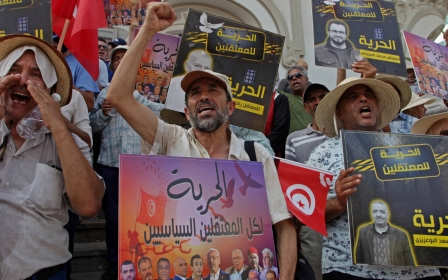Tunisian President Kais Saied guilty of 'murder' if jailed opponent dies, predecessor says

Tunisian President Kais Saied will be guilty of “murder” if the jailed leader of Tunisia’s main opposition party dies in prison, the North African country’s former president warned his successor.
“Be careful,” former Tunisian President Moncef Marzouki said at a conference held Monday in Washington DC for political prisoners in Tunisia.
“If this man dies in prison, you will be accountable for the murder because you knew that putting a man like this in prison is a death penalty sentence,” he added.
Marzouki was referring to Rached Ghannouchi, the leader of Tunisia's main opposition party, Ennahda, and the most prominent critic of Saied.
Ghannouchi was arrested in April and sentenced a month later in absentia to a year in prison, in a high-profile escalation of what activists and diplomats have described as a sweeping authoritarian crackdown by Saied that has imperiled one of the only democracies to emerge from the 2011 Arab Spring protests.
Stay informed with MEE's newsletters
Sign up to get the latest alerts, insights and analysis, starting with Turkey Unpacked
The 82-year-old politician suffers from hypertension and his family has repeatedly expressed concern over his health, saying he is being subject to “inhumane and harsh conditions.” He was reportedly transferred to a hospital in April when his health deteriorated after his arrest.
Ghannouchi was arrested among scores of journalists, activists and Saied’s political opponents, in what Amnesty International has decried as “a politically motivated witch hunt”.
'Drugged in a dark room'
Saied, a former constitutional law professor, was democratically elected Tunisia’s president in 2019. A fiery populist, Saied billed himself as an outsider who could take on Tunisia's established political parties, which oversaw growth in democracy but also mounting economic challenges in the country of 12 million.
In 2021, however, he shuttered parliament and replaced it with a rubber-stamp assembly. He later rewrote the constitution to consolidate power and has targeted political opponents. Meanwhile, his vow to fix the country’s ailing economy has fallen flat, as Tunisians cope with high inflation and shortages of basic goods.
Now, Marzouki, who was president of Tunisia from 2011-2014, has warned that his predecessor was “starting a new cycle of repression, of mock elections”, which risked sending Tunisia back to its authoritarian past.
Speaking alongside Marzouki, the daughter of Tunisian political prisoner Said Ferjani said Tunisia was reverting back to the era of authoritarian rule under Zine El Abidine Ben Ali, who was ousted during the Arab Spring.
“We had an independent judiciary. Now we have a judiciary that’s being used and abused,” Kaouther Ferjani said.
Said Ferjani, a prominent leader of Ennahda, was arrested in Tunis in February 2023 on several charges, including money laundering, attempting to change the nature of the state and undermining external State security, among other accusations.
Kaouther said her father had been put in a dark room and was drugged by security officials who wouldn’t let him sleep and played loud music.
Marzouki appealed directly to Tunisia’s judiciary and military to resist Saied’s efforts, telling them: “Stay away from this man”.
Aid debate
Rights groups have accused Saied of hollowing out Tunisia’s nascent independent institutions by using military courts to prosecute political opponents and military counter-terrorism units to carry out arrests.
Western countries sought to build up ties with Tunisian institutions, including the military, after the Arab Spring. And they have continued to work with Saied’s government. The EU signed a pact to stem the flow of migrants to Tunisia, which was slammed by rights groups.
Meanwhile, the Biden administration has continued to send aid to Tunisia’s military, enacting modest cuts in the face of criticism from some US lawmakers.
Marzouki didn’t comment on military assistance, but urged western countries to continue to provide aid and financial assistance to Tunisia because “the population is suffering, poverty is growing”.
“Even if it is a corrupt state and under a nondemocratic regime, support our people. Support our state,” he said.
But Marzouki’s plea contrasted with other speakers, underlining a debate over how much aid - both economic and military - the West should provide Tunisia.
Speaking at the event Monday, Mongi Dhaouadi, president of the Tunisia United Network activist group, urged US lawmakers to pass the Safeguarding Tunisian Democracy Act, legislation that would limit State Department-administered funding to Tunisia by 25 percent, including economic and security assistance, until Saied ends the state of emergency he declared on 25 July 2021.
Middle East Eye delivers independent and unrivalled coverage and analysis of the Middle East, North Africa and beyond. To learn more about republishing this content and the associated fees, please fill out this form. More about MEE can be found here.






